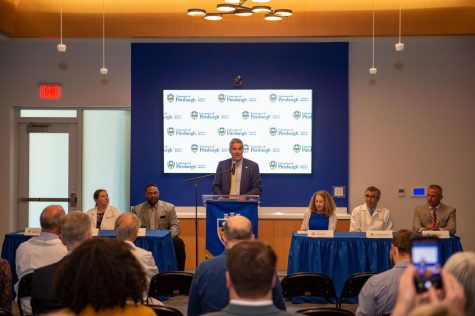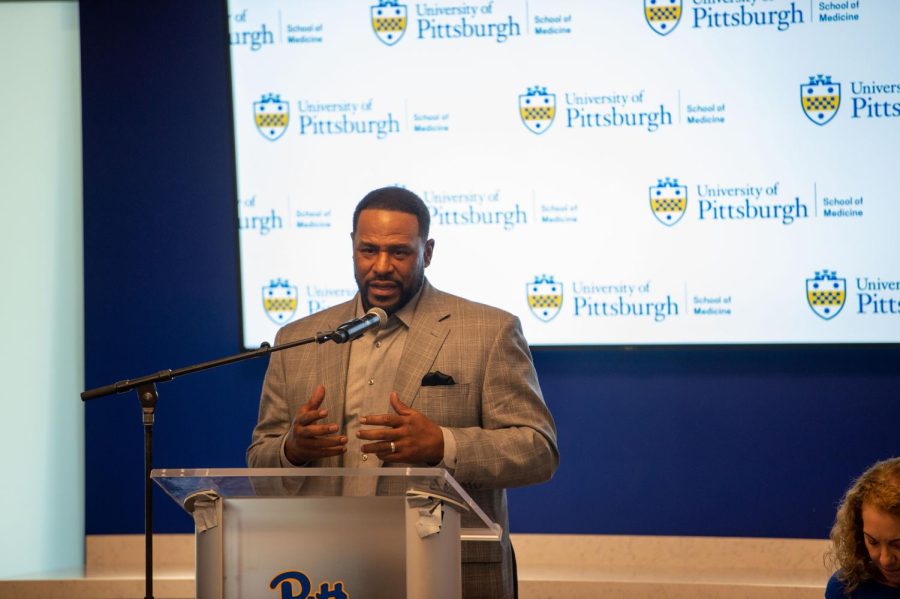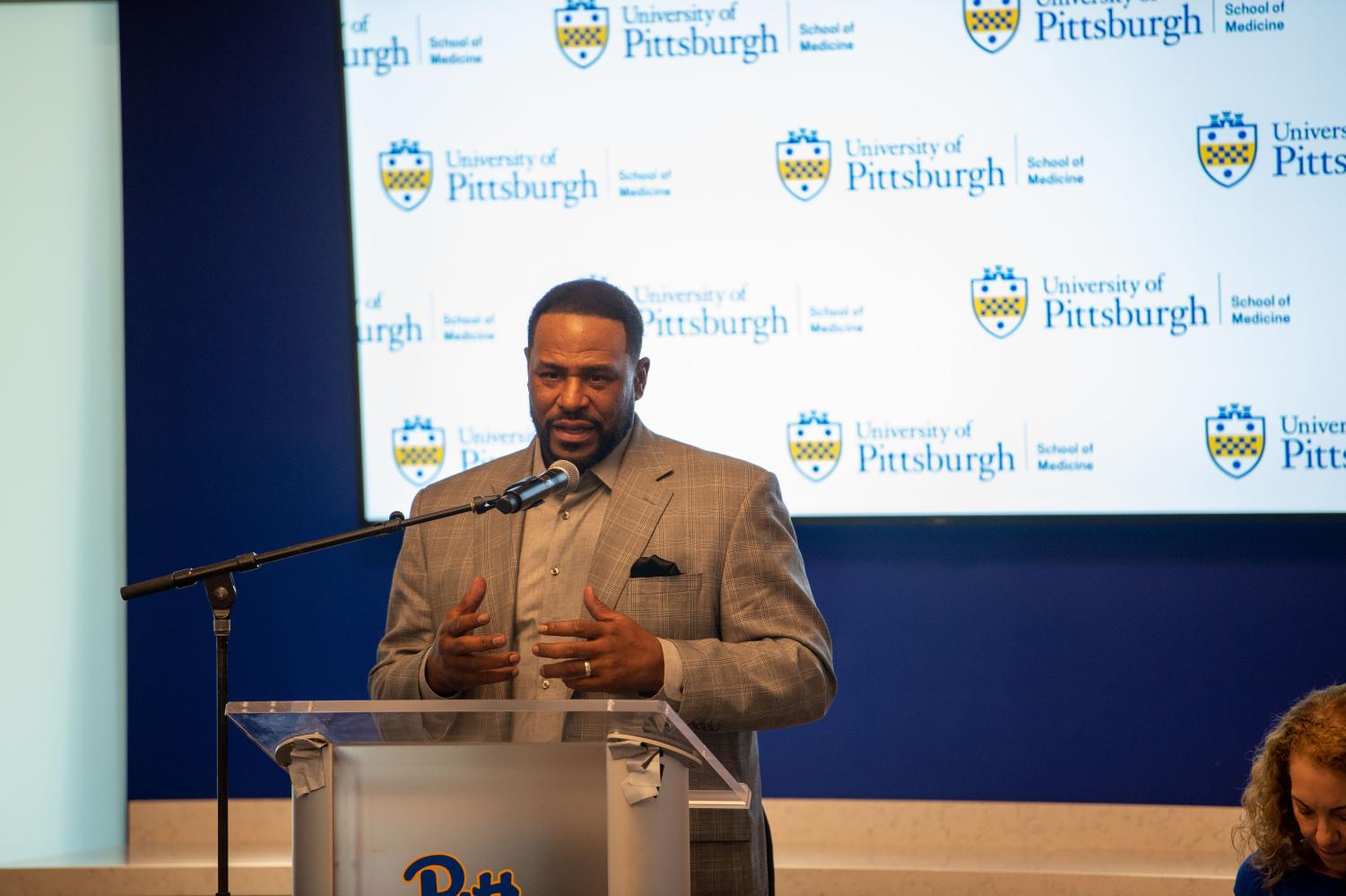National Sports Brain Bank created, researches causes and treatments for sports-related brain injuries
Johnathan Wright/University of Pittsburgh
Pro Football Hall of Fame running back Jerome Bettis speaking at a press conference on May 18.
May 24, 2023
As Dusty Kirk stood at the podium of a news conference last Thursday, she shared her experience with brain banks from when her husband, Bill Caroselli, passed away.
“When he was a student, he played football in high school, he played football and rugby at Brown University, and I started to notice that Bill was having difficulty in finding words and speaking,” Kirk, a board member of the Chuck Noll Foundation for Brain Injury Research, said. “He lost his ability to articulate.”
At the news conference, the University of Pittsburgh’s School of Medicine announced the creation of the National Sports Brain Bank (NSBB), a study that researches causes of and treatments for contact sport-related neurodegenerative disorders such as chronic traumatic encephalopathy (CTE), amyotrophic lateral sclerosis (ALS), Alzheimer’s disease, Parkinson’s disease and dementia.
The study is being funded by the Chuck Noll Foundation for Brain Injury Research and the Pittsburgh Foundation, which both provided $125,000, and the Richard King Mellon Foundation, which provided $500,000 in funding.
The NSBB joins a number of other brain banks at the University of Pittsburgh, including the Neurodegenerative Brain Bank, the Brain Institute Brain Bank and the Alzheimer’s Disease Research Center’s brain donation program.
After Kirk met with Dr. Oscar Lopez at Pitt’s Alzheimer’s Disease Research Center (ADRC), she quickly learned her husband’s symptoms weren’t aligned with any single brain disorder, and Lopez suggested that Caroselli donate his brain to Pitt for research.
“I asked Dr. Lopez if he would explain it directly to Bill,” Kirk said. “And Bill listened and he understood and he shook his head that that’s what he wanted. And Bill passed away, actually, five years ago yesterday.”
After recalling this experience, Kirk is thankful for what a brain bank gave her and others with Caroselli’s symptoms.
“Knowing the cause of what happened to Bill gave me some peace of mind,” Kirk said. “I knew it wasn’t from the sports that he loved to play, and it assured me that I had done the right thing, and not just for Bill, but for others.”
The longitudinal study will have participants submit information about their medical, cognitive and sports history. After that, participants and a close relative or friend will complete annual questionnaires that allow researchers to follow the potential development of neurodegenerative disorders. If participants consent, when they pass away, their brains will undergo a diagnostic evaluation and their brain tissue will be shared amongst the research community.
“I think this will build very important research, not just for us here at the University of Pittsburgh, but for the international research community,” Dr. Julia Kofler, director of the NSBB, said. “I think this will be a very big step into promoting CTE research in the future.”
According to Kofler, over 2,000 people have already donated their brains to the NSBB.
“We need additional brains because there are many other open questions,” Kofler said. “Many patients who have played contact sports…live on into their seventies and eighties…on the other hand, with my own eyes, I’ve looked at the brain of a fifteen-year-old teenager who had early CTE findings in their brain. So there’s a huge range of vulnerability, with some people being very susceptible and other people very resilient and we don’t really know what makes one person more vulnerable than others.”
When discussing who the NSBB will include in their upcoming study, Dr. Anantha Shekhar, Dean of the School of Medicine, said they are casting “a far wider net” than previous research has done.

“In addition to professional athletes, the research team will invite former athletes who participated in a variety of contact sports, whether that was playing on a high school level, college level, or recreationally,” Shekhar said. “Athletes who have not previously incurred a sports-related brain injury can also participate. The registry is open to all comers.”
Former Pittsburgh Steelers running back and current board member of the Chuck Noll Foundation Jerome Bettis spoke about how the NSBB’s work will keep future generations of athletes safer and healthier.
“I’m a father, and my son plays high school football, my daughter played high school basketball and she had multiple concussions,” Bettis said. “And so, for me, it’s important that I be that role model to show that we have that job, if you will, as a parent, to help protect our children. And that’s providing the information that can possibly help my son or my daughter in later years so that we can understand what we’re dealing with and do a better job with the next generation.”
Merril Hoge, another former Steeler and current Chuck Noll Foundation board member, touched on the work the NSBB has ahead of it.
“We’re all part of a team now. When we say ‘all comers,’ that means the more we have on our team, the better we’re going to be,” Hoge said. “It’s a long process, it’s an arduous process. But the more we have on our team, the more answers we’re gonna have and the better the team is going to be. And this can be the best brain bank in the world, done right. And the integrity and the principles are here.”




